Teacher background checks aren't just a box to tick— they are the guardians of school and student safety. In a world where trust shapes our learning environments, ensuring the people at the helm have clean records is fundamental. With each teacher standing as a cornerstone in a child’s daily life, background checks act as crucial gatekeepers, offering peace of mind to parents and administrators alike.
At the heart of these preventive measures lie foundational U.S. laws that govern the landscape of teacher background checks. Federal regulations like the Fair Credit Reporting Act (FCRA) ensure fairness in checks, while state laws complicate compliance. From California to New York, the goal is the same: to protect the integrity of education from potential threats. Understanding legal frameworks helps keep our schools safe for learning.
Key Takeaways
- Teacher background checks are crucial for maintaining school safety and building trust within educational communities.
- Legal frameworks for these checks, including federal and state laws, ensure that hiring practices are transparent and non-discriminatory.
- Comprehensive background checks involve multiple components such as criminal history, sex offender registry, and education verification.
- State-specific requirements can vary significantly, impacting fingerprinting procedures, lookback periods, and automatic disqualifiers.
- As technology advances, background checks are becoming more streamlined and effective, but schools must remain vigilant in adapting to these changes.
Why Teacher Background Checks Matter
When it comes to teaching, background checks are more than just a formality. They ensure student safety by vetting educators for risks. Schools are seen as safe havens, and maintaining that reputation is paramount. A thorough screening process prevents potential harm, offering peace of mind to parents and school staff alike.
Beyond security, background checks contribute to a school's reputation. An institution with strict pre-employment screening is seen as responsible and trustworthy, prioritizing student welfare. Hiring questionable staff can damage trust with parents and the community, along with potential legal issues.
EXPERT INSIGHT: Children are the most precious treasures in a parent's life, holding their hopes, dreams, and deepest love. When parents send their children to schools and universities, they do so with an unspoken trust that these institutions will nurture their potential and help them grow into extraordinary individuals. Each teacher and professor is not just an educator; they are the caretakers of this profound trust, representing the integrity of the entire educational system. Therefore, it is absolutely essential to ensure that these individuals are thoroughly vetted and are trustworthy, both within the academic walls and beyond. The well-being and development of our children hinge on the unwavering reliability of their educators, making it imperative that we uphold the highest standards in their selection and evaluation. Only then can we truly honor the trust that parents place in our education system and create a safe, nurturing environment for our children to flourish. - Emile Garcia, SHRM-SCP, CHRP, CHRBP
Legal Framework for Teacher Background Checks
Federal Laws
When it comes to federal oversight in teacher background checks, a couple of key legislative acts take center stage. First up is the Fair Credit Reporting Act (FCRA). The FCRA establishes rules for conducting accurate and private background checks through consumer reporting agencies. Under this law, if a school uses an external service for background checks, they're obligated to disclose this to the candidate and get their written consent. Plus, if any adverse action is taken based on the check, like deciding not to hire, the candidate must be informed and given a clear explanation of the process.
Next is Title VII of the Civil Rights Act, which puts a different kind of pressure on hiring practices. While the Act doesn’t directly address background checks, it emphasizes non-discriminatory processes. So, it's essential for schools to apply background check policies evenly across all candidates to avoid accusations of discrimination. This means an unwavering benchmark: similar checks, similar interpretations of results, and similar consequences regardless of the candidate's race, color, or national origin. Though simple in concept, in practice, it requires meticulous attention to ensure equality is ingrained at every step.
State-Specific Laws and Regulations
Navigating the maze of state-specific laws for teacher background checks can feel like a game of Ping-Pong—each state bats its own set of rules across the table. Despite federal guidelines setting the groundwork, states enjoy the liberty to pile on extra requirements, with variations that often surprise. Consider California: with its strict privacy laws, schools must tread gently, balancing thorough checks with respecting personal records. Meanwhile, Texas takes a different approach, demanding fingerprint-based background checks for all educators, complemented by periodic updates to keep tabs on any subsequent legal issues.
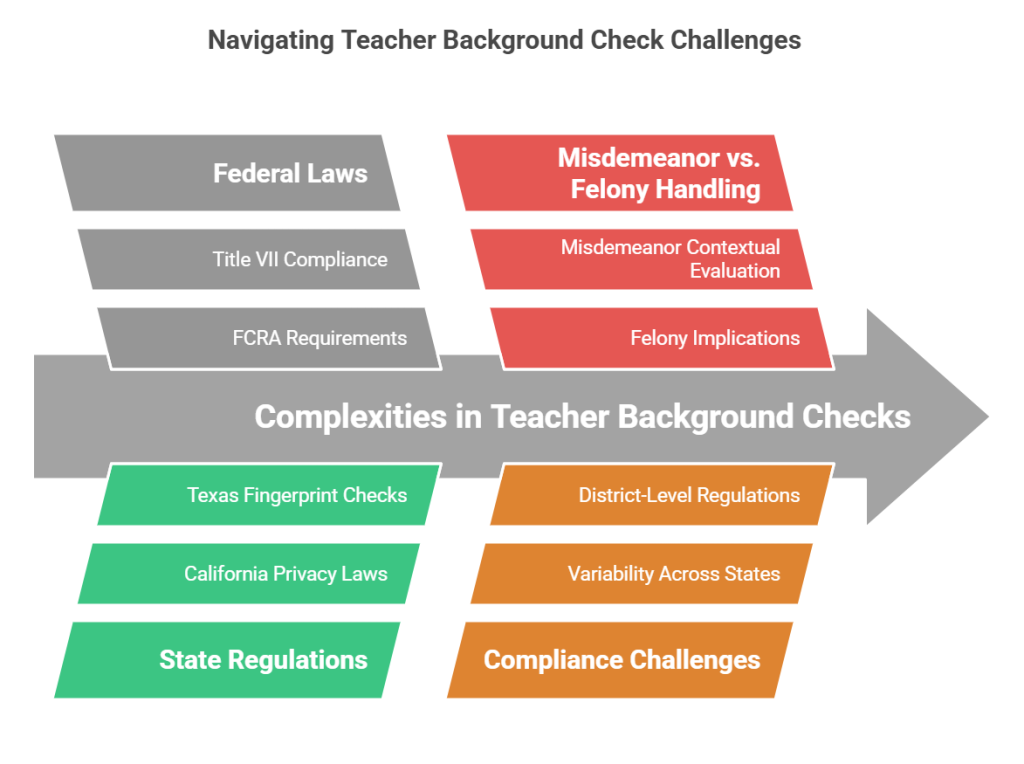
New York’s system leans into complexity, implementing what's known as “moral character” assessments to ensure that teachers adhere not just to legal standards, but ethical ones too. Florida, on the other hand, pushes for speedy results, utilizing advanced databases to streamline and accelerate the process.
These examples highlight a significant challenge for those involved in educational hiring—staying compliant with a patchwork of legal stipulations. Whether it’s through state mandates or district-level regulations, understanding the local lay of the land is crucial. Schools must not only be compliant but agile, adapting to the nuances of each state's legislative environment to safeguard their students effectively.
Handling of Misdemeanors vs. Felonies
In navigating the labyrinth of teacher background checks, understanding the distinctions between misdemeanors and felonies is crucial. Both have profound implications for employability, though they diverge significantly in terms of severity and consequences.
Misdemeanors are generally considered less severe offenses, such as petty theft or disorderly conduct. Typically, these offenses might not immediately disqualify a candidate, but they can raise red flags depending on the nature of the job and the circumstances surrounding the offense. Schools often weigh the context and time since occurrence heavily before deciding.
Conversely, felonies denote more serious crimes like assault or fraud. These can be immediate deal-breakers due to the grave implications they carry for student and school safety. However, even with felonies, there's room for nuance. Some districts may consider the time elapsed since the conviction, evidence of rehabilitation, and the relevance of the conviction to the candidate’s potential role.
Ultimately, hiring decisions rest on a balanced evaluation of the conviction's nature, the candidate's background, and the legal framework set by state and federal laws. Tailored guidelines help schools assess these factors carefully, ensuring fair yet rigorous screening processes while maintaining a safe educational environment.
Components of a Comprehensive Teacher Background Check
Here's a table with the types of education background checks commonly conducted in the U.S.:
| Type of Check | Level of Use | Reason |
|---|---|---|
| Criminal Record Check | High (e.g., Texas, California, New York) | Ensures that candidates do not have serious criminal backgrounds that could affect student safety. |
| Sex Offender Registry Check | High (e.g., Florida, Pennsylvania, Illinois) | Prevents hiring individuals who are registered sex offenders to protect students and school staff. |
| Child Abuse Registry Check | Moderate to High (e.g., Pennsylvania, Ohio) | Screens for individuals with a history of child abuse or neglect to ensure child safety in schools. |
| Employment Verification | Moderate (common in most states) | Verifies previous job roles, ensuring experience aligns with teaching requirements. |
| Education Verification | High (e.g., New York, Florida, Texas) | Confirms candidates’ educational qualifications, such as teaching certificates or degrees. |
| Reference Check | Moderate (common in most states) | Provides insights into a candidate’s character, teaching skills, and suitability for the role. |
| Drug Testing | Low to Moderate (varies by district) | Ensures candidates are not using illegal substances that could impair their teaching effectiveness. |
When employing teachers, thorough background checks are more than just a formality; they are the foundation of a safe and trusted educational environment. Here's what these checks typically entail:
Criminal History Checks
When examining a teacher's criminal history, both misdemeanors and felonies come under scrutiny. Misdemeanors, typically less severe crimes, might include minor theft or disorderly conduct. While they don't automatically disqualify a candidate, multiple or recent misdemeanors could raise red flags. Felonies, on the other hand, are serious offenses like assault or fraud, and most schools have strict policies against hiring individuals with certain felony convictions.
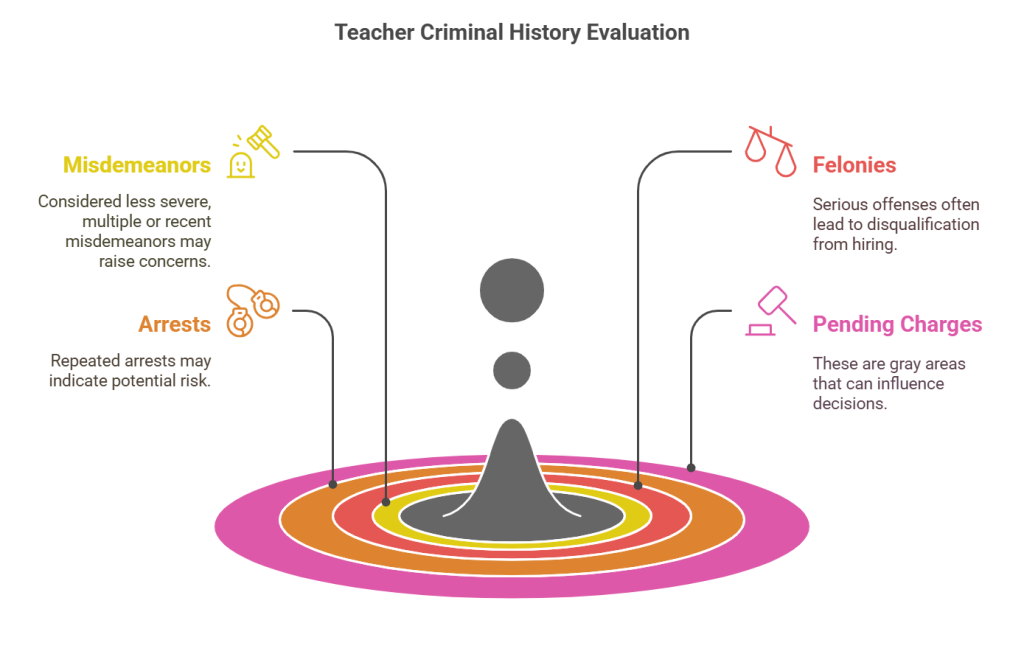
Background checks don't just look at past convictions; any arrests and pending charges also bear weight. These elements are crucial because they provide a fuller picture of a person's legal interactions. Although an arrest doesn't equate to guilt, schools may view repeated arrests as a potential risk, requiring further inquiry. Meanwhile, pending charges are a gray area; without a conviction, they can't be the sole basis for rejection, but they may still influence hiring decisions if tied to severe allegations.
This cautious evaluation aims to balance fairness towards candidates with the paramount need for student and staff safety—ensuring the past doesn't overshadow the present unnecessarily, yet still safeguarding educational environments.
Sex Offender Registry Checks
A 2004 Department of Education study estimates that nearly 9.6 percent of students are targets of educator sexual misconduct sometime during their school career. As such, sex offender registry checks are a critical component of teacher background screenings, designed to ensure the safety of students and the broader school community. These checks sift through federal and state registries to verify that applicants are not listed as registered sex offenders. The significance is simple: no school wants to unwittingly place individuals with a history of sexual offenses in positions of trust with children.
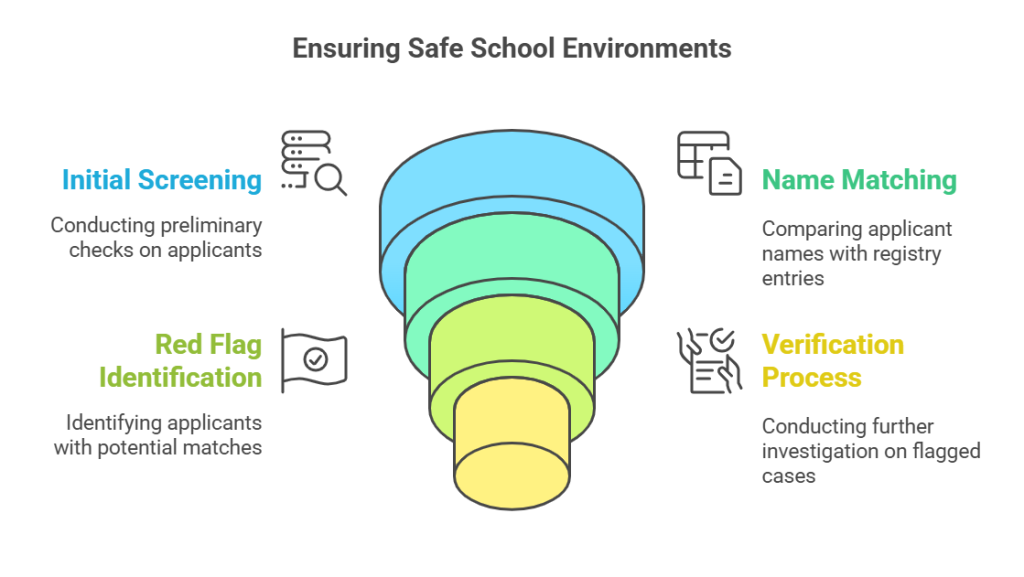
Sex offender registry checks are straightforward but crucial. They involve checking names against state and national databases, such as the National Sex Offender Public Website. If a match is found, it raises a red flag that requires immediate attention and verification.
The importance of these checks cannot be overstated. While not foolproof—since not every case out there will have resulted in a conviction—they are a key preventive measure in hiring. Schools must vigilantly conduct these checks to safeguard students.
In some regions, these checks are legally mandated, but even where they are not, it's a best practice to include them. They help protect children, minimize risks for schools, and uphold community trust. Given the serious consequences of missing such vital background data, ignoring this aspect of screening is not merely negligent but potentially disastrous.
Ultimately, sex offender registry checks are about due diligence. They provide a necessary filter in the hiring process, ensuring that educational institutions maintain their primary mandate: to be safe places for learning.
Child Abuse and Neglect Registry Checks
Child Abuse and Neglect Registry Checks are a critical part of the teacher background check process. These checks serve a straightforward purpose: to identify individuals who have a history or record of child abuse or neglect. The aim is to prevent anyone with such a history from gaining employment in a role that involves caring for or supervising children.
The registry compiles data from various sources, including investigations conducted by child protective services. It reflects determinations where there is credible evidence that an individual has engaged in harmful behavior towards children. The inclusion of this check is required in many states to ensure that educators entering the classroom have a clean record in terms of child welfare.
It's essential for schools to conduct these checks diligently. Since the role of a teacher extends beyond mere academic instruction to nurturing and safeguarding students, any oversight can potentially endanger students and tarnish the school’s reputation. There are challenges, as the details and scope of registry checks can vary by state due to different definitions and criteria for entry into a registry. Education administrators must navigate these differences carefully.
By implementing comprehensive checks, schools not only protect their students but also align with state mandates, thus reducing risk and promoting a safer educational environment.
Education Verification
Education verification serves as a critical component in teacher background checks, ensuring that applicants possess the requisite qualifications to educate our youth. This process involves confirming the authenticity of degrees and certificates claimed by candidates. It sounds straightforward, right? Well, not always. Inconsistent record keeping by institutions can sometimes complicate things. Plus, degrees from online or unaccredited schools require a fine-toothed comb.
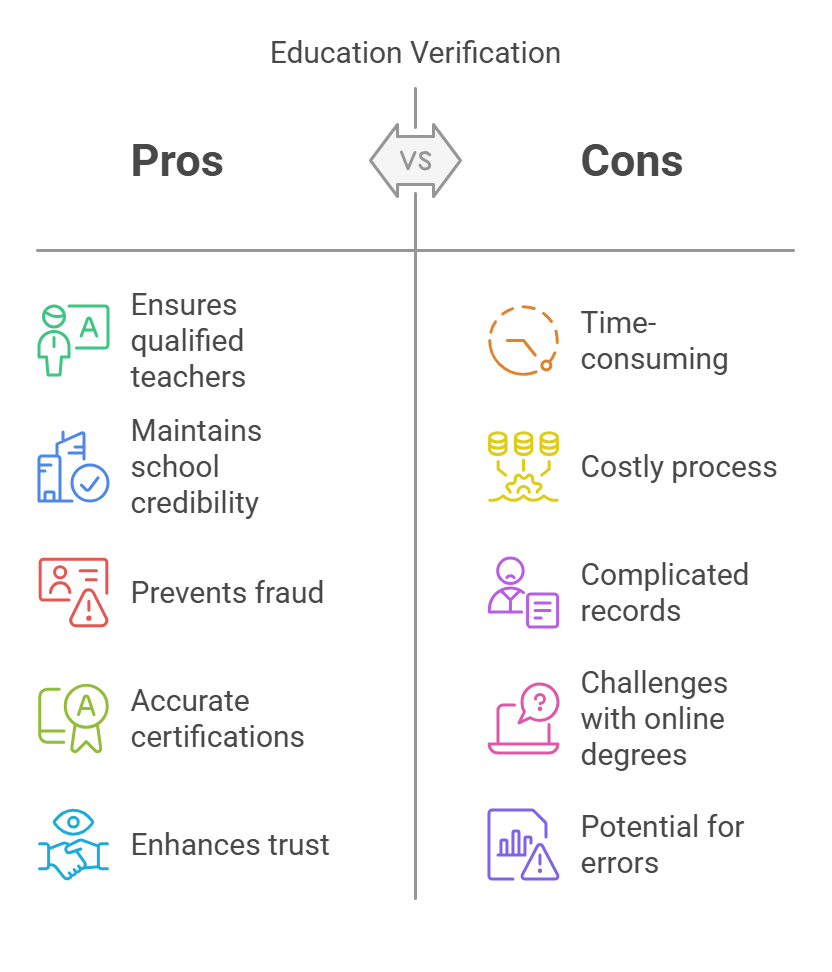
Employers look for accuracy in fields like teaching certifications and endorsements because these directly impact what a teacher is qualified to teach. The cost of overlooking a fabricated diploma isn't just academic; it can tarnish a school's credibility. That's why precise education verification is indispensable. Sure, it might feel like a tedious step in hiring. Still, it separates qualified educators from those stretching the truth, ensuring that teachers in classrooms are what they claim to be: educated and prepared to inspire.
Employment History Verification
Employment history verification isn’t just about confirming years worked or job titles; it's a crucial step in piecing together a candidate's professional narrative. Schools dive into this verification process to ensure past roles align with what candidates claim. This diligence prevents any embellishment that could mask potential red flags.
Checking employment history helps schools identify any gaps in employment or inconsistencies that might warrant a closer look. It allows administrators to see if a teaching candidate has a stable employment record or if they tend to jump from job to job, which might indicate underlying issues.
The process is straightforward but meticulous. It typically involves contacting previous employers to confirm dates of employment, positions held, and often, the reason for leaving. Some schools also inquire about the candidate's performance and conduct during their past roles, although responses to these queries can be limited by company policy.
Accurate employment history helps paint a true picture of a candidate's professional journey, enabling schools to make informed hiring decisions. It’s one piece of the puzzle that, when combined with other background checks, helps in ensuring that educators are well-suited for the responsibility of shaping young minds.
Professional License Verification
In the realm of teacher background checks, professional license verification acts as a vital checkpoint in affirming the qualifications of educational candidates. This straightforward process ensures that applicants possess the necessary credentials to perform their teaching duties effectively and legally.
The verification process involves cross-referencing the applicant’s claimed teaching licenses with the official records maintained by state education departments or professional boards. It's not just about confirming the existence of a license; the check also verifies the license's validity, ensuring it hasn't expired or been revoked due to disciplinary measures.
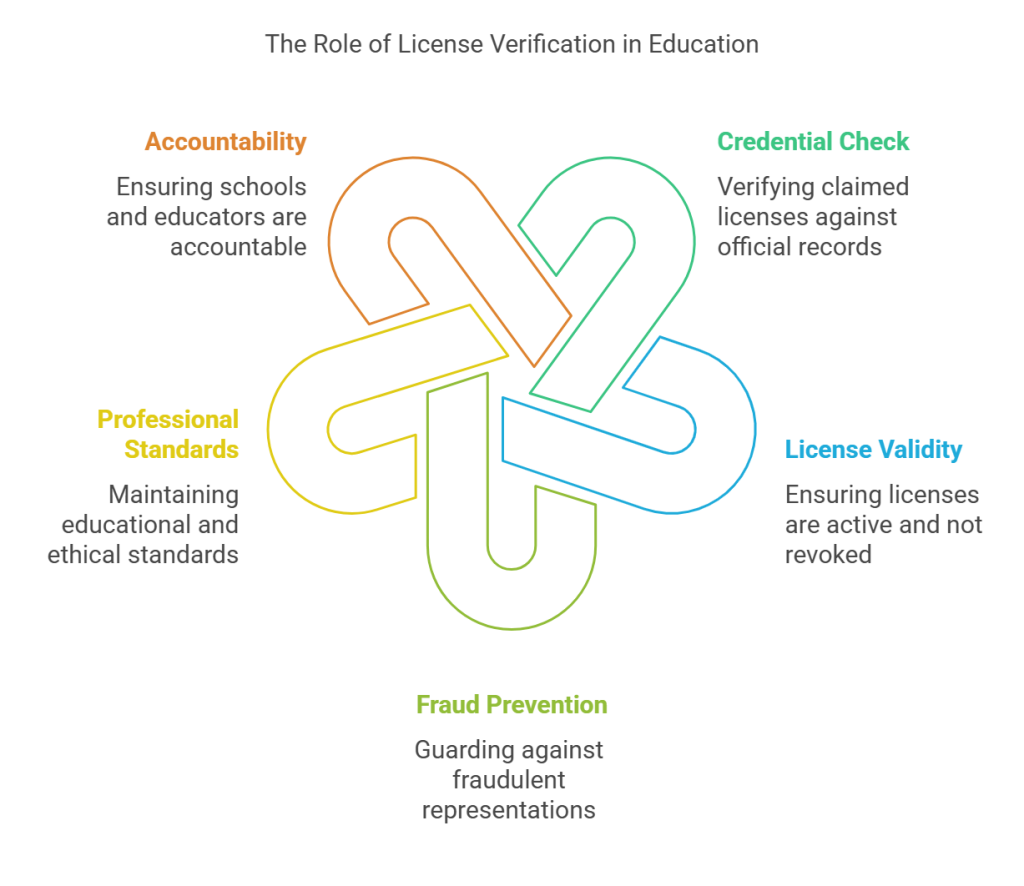
Why does this matter? Teaching isn’t just about subject knowledge; it’s about adhering to professional standards that ensure a safe and effective learning environment. An unverified or revoked license can point to potential unreported issues, ranging from lapses in ongoing education requirements to more serious professional misconduct.
Though not the most glamorous part of the hiring process, license verification remains non-negotiable. It guards against fraudulent representations and secures the foundational trust upon which schools and educators build their reputations. In short, it’s a step that keeps schools accountable and protects students’ right to quality education delivered by qualified professionals.
Drug Testing
Drug testing, often a controversial component of teacher background checks, serves to ensure a drug-free environment for students and staff. Despite heated debate, many schools consider it a crucial step in ensuring safety and maintaining public trust. By requiring drug tests, schools aim to identify substance abuse issues that could otherwise jeopardize student welfare and the educational mission.
The process typically involves pre-employment testing, which checks for common illegal substances, and may extend to random or reasonable-suspicion testing during employment. While some argue that it infringes on privacy, the prevailing view is that it is a necessary measure given the responsibilities educators hold. It's worth noting that policies on drug testing can vary widely between districts and states, with some institutions being more stringent than others in enforcing these policies.
Navigating this aspect of background checks requires balancing the need for a safe learning environment with respecting individual rights—all while adhering to relevant laws and regulations. Schools should ensure transparency in their drug testing policies and procedures to mitigate any potential concerns, fostering an environment where safety and trust coexist.
Credit Checks (Where Applicable)
When it comes to vetting potential hires in the education sector, credit checks are somewhat of a gray area, applied selectively based on the specific requirements of the job. While not universally mandated, their usage can offer insights into a candidate's financial responsibility—a factor some institutions value, particularly when the role involves handling funds.
Credit checks reveal information such as an individual's payment history, debt load, and overall credit management. These details can sometimes correlate with judgment and reliability; however, their importance should be weighed with caution, ensuring they are not used to unfairly disqualify candidates. For instance, a patch of bad credit shouldn't automatically blacklist someone from teaching, especially if economic hardship rather than irresponsibility is the root cause.
Educational institutions considering credit checks should first clarify their rationale. Do they truly need this data to assess a teacher's suitability? If so, they must adhere to the Fair Credit Reporting Act (FCRA) guidelines, which require obtaining explicit consent from candidates before delving into their credit history.
Ultimately, while credit checks can play a role in the broader spectrum of background screenings, they should be handled judiciously, respecting applicants' privacy while focusing on factors inherently relevant to their teaching capabilities. After all, a teacher's value isn't measured by their credit score but by their ability to educate and inspire.
State-Specific Rules and Requirements
When it comes to background checks, one size doesn’t fit all. Each state brings its own quirks to the table, demanding a closer look at how local rules play out in practice. Here’s a breakdown of key components that vary state by state:
Fingerprinting Requirements
Fingerprinting has become a staple in the teacher background check process, but the requirements differ significantly across state lines. Some states, like California and New York, mandate live scan fingerprinting as part of the hiring process. Others, such as Texas, allow districts to decide whether they conduct fingerprint checks, relying instead on broader criminal history databases. The disparity underlines the need for educational institutions to stay informed about local mandates.
Lookback Periods for Criminal History
Another area of divergence lies in lookback periods—the duration for which a criminal record is examined. States like Florida may scrutinize an applicant's history going back decades, whereas others might set a more forgiving timeframe of the past seven years for misdemeanors. These variations affect hiring decisions and underscore the importance of knowing the local landscape.
Automatic Disqualifiers
Certain offenses can automatically disqualify an applicant from teaching positions, but what constitutes an automatic disqualifier isn't uniform. For instance, some states deem specific felonies—such as those involving violence or sexual misconduct—as grounds for outright rejection. Meanwhile, other jurisdictions might grant discretion to consider the context of an offense, allowing for a more nuanced decision-making process.
Consideration of Rehabilitation
Rehabilitation and its acknowledgment in background checks vary as well. Some states promote opportunities for applicants to demonstrate rehabilitation, offering pathways to appeal an initial disqualification. Programs and certificates that prove rehabilitation might sway hiring decisions in states that value second chances, reflecting a commitment to balancing safety with fairness.
Navigating these elements requires a keen understanding of not just the letter of the law, but its practical implications on the educational workforce. By grasping these state-specific nuances, schools can tailor their hiring protocols to remain compliant while ensuring they select candidates who contribute positively to the learning environment.
Best Practices for Conducting Teacher Background Checks
When it comes to teacher background checks, consistency is king. Having a clear and uniform policy ensures that everyone is vetted by the same standards, preventing biases that could lead to trouble down the line. Before diving into a background check, make sure you have proper consent. This is not just about getting a signature but documenting it carefully—covering your bases legally is crucial.
Choosing the right service is another key aspect. Go for accredited providers that specialize in educational background checks. They'll know the specific requirements and what's relevant in this context. But even the best service's report is only as good as its interpretation. Be fair and consistent when reviewing results, balancing the legal requirements with ethical considerations.
Handling criminal records, especially misdemeanors and felonies, needs a nuanced approach. Develop a protocol for assessing different types of convictions, weighing factors like recency, relevance, and severity. This ensures you're making informed hiring decisions while also being fair to the applicants. Remember, each record tells a story—it's up to you to read between the lines sensibly.
Challenges in Teacher Background Checks
When it comes to teacher background checks, a host of challenges looms, complicating what ideally would be a straightforward process. One major headache is interstate information sharing. Given the transient nature of American society, teachers move across state lines regularly, yet accessing comprehensive, accurate background information from different states remains daunting. Disparities in state record-keeping and reporting add layers of difficulty, often delaying hiring processes.
Sealed or expunged records add another layer of complexity. These records, albeit legally hidden or erased, can be relevant to assessing a candidate's suitability. However, the legality surrounding their inclusion in background checks is murky at best, often leaving school administrators in a legal limbo.
Even more nuanced is the balance between privacy concerns and safety. Schools must tread carefully, respecting individual privacy rights while ensuring the safety of their students—a tightrope walk that demands meticulous attention to legal standards and ethical guidelines.
Lastly, discrepancies in state laws create a patchwork regulatory landscape. What might be permissible or relevant in one state could be entirely disregarded in another, leading to inconsistencies that schools must navigate. This fragmented approach can hamper efforts to institute cohesive policies nationwide, leaving gaps that potentially risk school safety. In sum, these challenges require concerted efforts to harmonize and streamline processes while safeguarding rights and security.
Technology and Innovation in Background Screening
In the evolving landscape of teacher background checks, technology is reshaping how schools approach screening. Artificial intelligence (AI) and machine learning are being integrated to refine and accelerate the process. These technologies sift through vast amounts of data to identify potential red flags more efficiently than traditional methods. They can spot patterns or anomalies in an applicant's history that might be easily overlooked by human evaluators, ensuring a thorough and unbiased review.
Continuous monitoring is another tech-driven advancement gaining traction. Unlike static checks conducted only at hiring, continuous monitoring allows for ongoing assessment of employees. This helps schools stay informed about any legal issues teachers might encounter during their employment, fostering a proactive approach to student safety.
Moreover, integrating background checks into HR systems is making the entire process more seamless. Technology platforms now often offer integrations that automate large parts of the verification process, from criminal records to credential checks, saving time and reducing error. As these tech solutions become more sophisticated, schools can handle background screenings with greater efficiency and accuracy, ultimately contributing to a safer and more secure educational environment.
Case Studies: Successful Implementation of Background Check Programs
In today’s educational landscape, thorough and well-executed background check programs are crucial. Here are some standout examples of school districts that have effectively implemented these programs, along with key takeaways that other institutions might find instructive.
Examples from Different School Districts
Take the Meridian Unified School District in Idaho, which revamped its entire hiring protocol after a high-profile incident shook the community. They adopted a layered approach, combining federal and state resources, education verification, and stringent sex offender registry checks. The district saw immediate improvements—a testament to how robust systems can deter potential issues before they arise. Meanwhile, Huntsville City Schools in Alabama integrated an AI-driven monitoring system that flags any legal changes in real time, enhancing proactive responses to any red flags.
Lessons Learned
Consistency proved to be a game-changer for these districts. By setting a standard policy that applies uniformly across all hires, they ensured a fair yet thorough vetting process. Another crucial takeaway is the value of transparency. Both districts were clear in communicating the purpose and scope of background checks to potential hires, fostering trust and compliance. Additionally, ongoing training for HR personnel on how to interpret results fairly and justly was stressed.
Criminal Case Handling
Handling criminal histories was another area where these districts excelled. Misdemeanors were reviewed in context, considering factors such as the time elapsed since the conviction and evidence of rehabilitation. This balanced approach allowed them to maintain a safe environment without dismissing potentially suitable candidates solely based on past mistakes. Felonies, particularly those related to violence or child protection laws, were approached with zero tolerance, ensuring that student safety remains the top priority.
These examples underline that with the right blend of technology, consistency, and empathy, educational institutions can implement background check programs that not only safeguard but also support a diverse and dynamic teaching workforce.
The Future of Teacher Background Checks
In an ever-evolving digital landscape, the future of teacher background checks seems set for transformation, promising more thorough and efficient processes. One emerging trend is the push towards continuous monitoring. Unlike traditional checks performed at the point of hiring, continuous monitoring keeps an ongoing watch on teachers' backgrounds, flagging any new issues in real-time. This proactive approach offers a significant step forward in maintaining campus security.
Moreover, legislative changes loom on the horizon. With schools becoming more vigilant, states may enact stricter rules, potentially aligning more closely with federal standards, ensuring that loopholes are minimized, and consistency is achieved across the board. Each state's approach to handling sealed or expunged records may also see reform, as the balance between privacy and safety continues to be a hot topic.
On the technological front, innovations like AI and machine learning are gradually entering the scene. These advancements promise not only faster processing times but also enhanced accuracy in identifying critical flags. By integrating advanced algorithms, background screening can become more nuanced, discerning patterns and anomalies that might ordinarily be overlooked. Additionally, the integration of background checks with broader HR systems is anticipated to streamline administrative tasks, producing a more seamless data flow and management process.
In essence, while challenges remain, the future of teacher background checks lies in becoming more dynamic, comprehensive, and reliable. Adaptation to these trends and compliance with potential legislative reforms will be paramount for educational institutions aiming to continue safeguarding their students and maintaining their reputational integrity.
FAQs About Teacher Background Checks
Can felons be teachers?
The ability for felons to become teachers varies greatly depending on the jurisdiction and the nature of the felony. Some regions have specific laws that prohibit individuals with certain types of felonies, particularly those involving violence, sexual offenses, or drug-related crimes, from obtaining a teaching license. Other jurisdictions may allow felons to become teachers if they demonstrate rehabilitation and meet other criteria. It's essential to check the specific laws and regulations of the state or country where you wish to teach.
Can you be a teacher with a misdemeanor?
Yes, it is generally possible to be a teacher with a misdemeanor on your record, although this, too, can depend on the nature of the misdemeanor and the regulations of the area in which you intend to teach. Some misdemeanors may not impact your ability to obtain a teaching license, while others, especially those related to ethics or behavior, might be scrutinized more closely. School districts often consider the severity of the misdemeanor and whether it demonstrates a pattern of behavior that might be concerning.
What types of criminal charges typically disqualify someone from becoming a teacher?
Criminal charges that often disqualify someone from becoming a teacher include felonies related to child abuse, sexual offenses, violence, and serious drug offenses. Each state or country may have specific laws that outline disqualifying offenses, so it's crucial to review local regulations to understand what might impact your eligibility.
Are background checks required for teaching positions?
Yes, background checks are usually required for teaching positions. These checks typically include a review of criminal history, sex offender registries, and sometimes even credit checks. The specific requirements can vary by jurisdiction, but background checks are generally part of the vetting process to ensure the safety and welfare of students.
Can a teaching license be revoked due to criminal activity?
Yes, a teaching license can be revoked due to criminal activity. If a teacher is convicted of a crime that is deemed incompatible with maintaining a safe and professional educational environment, particularly felonies or misdemeanors involving moral turpitude, the local education authority can revoke the teaching license. The exact procedures and grounds for revocation will depend on the governing education body's rules and regulations.
Is it possible to appeal a denial of a teaching license due to a criminal record?
In many cases, it is possible to appeal a denial of a teaching license due to a criminal record. The process typically involves presenting evidence of rehabilitation, demonstrating that the offense does not impact your ability to teach, or arguing procedural errors in the initial denial. The appeal process can vary by jurisdiction, so it's important to understand the specific steps and requirements in your area.
What types of criminal history are checked during teacher background screenings?
Background checks typically involve a thorough look at both misdemeanor and felony convictions. Felonies are serious crimes often resulting in severe penalties, while misdemeanors are lesser offenses that might carry lighter sentences. The impact on employability depends on the nature of the crime and how it's perceived in relation to child safety and educational integrity.
Do misdemeanors automatically disqualify someone from being hired as a teacher?
Not necessarily. Schools often evaluate the nature and relevance of a misdemeanor before making a decision. Factors such as the severity of the offense, time elapsed since the incident, and evidence of rehabilitation are considered. Each case is unique, and some states have specific regulations or guidelines regarding misdemeanor offenses.
How do state-specific rules affect background checks for teachers?
Each state has its own rules and regulations governing background checks. This can include differences in the lookback period for criminal history, the consideration of juvenile records, and the impact on employability due to sealed or expunged records. Understanding state-specific requirements is crucial for compliance and informed hiring decisions.
Are there automatic disqualifiers in teacher background checks?
Certain offenses, such as crimes involving child abuse or sexual misconduct, may automatically disqualify someone from being employed in a teaching position. States often maintain a list of such disqualifying offenses, which schools must adhere to when conducting background checks.
What role do rehabilitation and character references play in the background check process?
Schools may consider evidence of rehabilitation and character references, especially if the applicant has a criminal record. This could involve letters from community leaders, proof of voluntary community service, or participation in rehabilitation programs. These factors can positively influence hiring decisions, demonstrating an individual's commitment to reform.
Can individuals contest the findings of a background check?
Yes, under the Fair Credit Reporting Act (FCRA), individuals have the right to dispute inaccuracies in their background check. It is the responsibility of the educational institution or the background check provider to address and rectify any errors promptly.
Conclusion
As we conclude this guide on teacher background checks, it's clear they play a pivotal role in ensuring the safety and integrity of educational environments. From federal and state laws to the nuances of handling misdemeanors and felonies, understanding the layers involved in background screening is crucial for educational institutions. Schools must prioritize regular reviews and updates of their background check processes. By doing so, they not only comply with legal requirements but also foster safe learning spaces. The stakes are high, and a proactive stance today can prevent issues tomorrow. Stay informed, stay safe.

